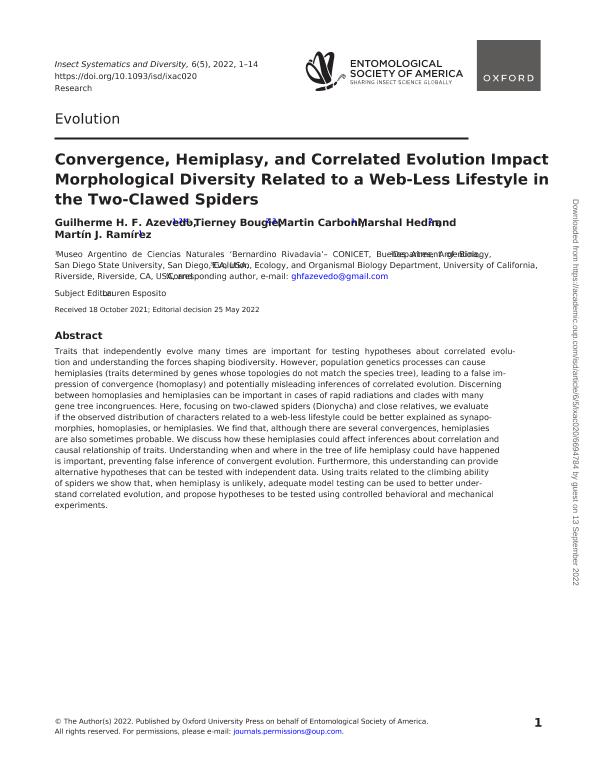Artículo
Convergence, Hemiplasy, and Correlated Evolution Impact Morphological Diversity Related to a Web-Less Lifestyle in the Two-Clawed Spiders
Azevedo, Guilherme H. F.; Bougie, Tierney; Carboni, Martín Federico ; Hedin, Marshal; Ramirez, Martin Javier
; Hedin, Marshal; Ramirez, Martin Javier
 ; Hedin, Marshal; Ramirez, Martin Javier
; Hedin, Marshal; Ramirez, Martin Javier
Fecha de publicación:
09/2022
Editorial:
Oxford University Press
Revista:
Insect Systematics and Diversity
ISSN:
2399-3421
Idioma:
Inglés
Tipo de recurso:
Artículo publicado
Clasificación temática:
Resumen
Traits that independently evolve many times are important for testing hypotheses about correlated evolution and understanding the forces shaping biodiversity. However, population genetics processes can cause hemiplasies (traits determined by genes whose topologies do not match the species tree), leading to a false impression of convergence (homoplasy) and potentially misleading inferences of correlated evolution. Discerning between homoplasies and hemiplasies can be important in cases of rapid radiations and clades with many gene tree incongruences. Here, focusing on two-clawed spiders (Dionycha) and close relatives, we evaluate if the observed distribution of characters related to a web-less lifestyle could be better explained as synapomorphies, homoplasies, or hemiplasies. We find that, although there are several convergences, hemiplasies are also sometimes probable. We discuss how these hemiplasies could affect inferences about correlation and causal relationship of traits. Understanding when and where in the tree of life hemiplasy could have happened is important, preventing false inference of convergent evolution. Furthermore, this understanding can provide alternative hypotheses that can be tested with independent data. Using traits related to the climbing ability of spiders we show that, when hemiplasy is unlikely, adequate model testing can be used to better understand correlated evolution, and propose hypotheses to be tested using controlled behavioral and mechanical experiments.
Archivos asociados
Licencia
Identificadores
Colecciones
Articulos(MACNBR)
Articulos de MUSEO ARG.DE CS.NAT "BERNARDINO RIVADAVIA"
Articulos de MUSEO ARG.DE CS.NAT "BERNARDINO RIVADAVIA"
Citación
Azevedo, Guilherme H. F.; Bougie, Tierney; Carboni, Martín Federico; Hedin, Marshal; Ramirez, Martin Javier; Convergence, Hemiplasy, and Correlated Evolution Impact Morphological Diversity Related to a Web-Less Lifestyle in the Two-Clawed Spiders; Oxford University Press; Insect Systematics and Diversity; 6; 5; 9-2022; 1-14
Compartir
Altmétricas



